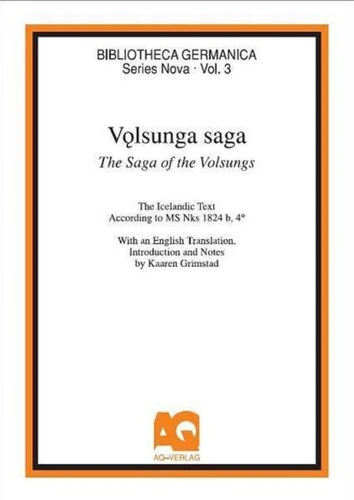Volsunga Saga / The Saga of the Volsungs. Bilingual Edition (Icelandic/English)
Par :Formats :
Disponible dans votre compte client Decitre ou Furet du Nord dès validation de votre commande. Le format PDF est :
- Compatible avec une lecture sur My Vivlio (smartphone, tablette, ordinateur)
- Compatible avec une lecture sur liseuses Vivlio
- Pour les liseuses autres que Vivlio, vous devez utiliser le logiciel Adobe Digital Edition. Non compatible avec la lecture sur les liseuses Kindle, Remarkable et Sony
 , qui est-ce ?
, qui est-ce ?Notre partenaire de plateforme de lecture numérique où vous retrouverez l'ensemble de vos ebooks gratuitement
Pour en savoir plus sur nos ebooks, consultez notre aide en ligne ici
- Nombre de pages245
- FormatPDF
- ISBN978-3-922441-04-5
- EAN9783922441045
- Date de parution17/03/2018
- Protection num.Digital Watermarking
- Taille2 Mo
- Infos supplémentairespdf
- ÉditeurAQ-Verlag
Résumé
Volsunga saga ranks as one of the foremost works of prose written in thirteenth-century Iceland.
A highly dramatic rendering of tales from the remote Germanic past, the saga presents the Old Norse version of the story of the Volsungs, Gjukungs, and Budlungs, three families fated to destroy each other.
A continental German version of this history is recounted in the well-known Middle High German epic the Nibelungenlied.
The author composed the saga using earlier cycles of heroic poems, imbedding in his prose text a number of poetic stanzas and one nearly complete poem that we also have recorded in a thirteenth-century collection of poetry known as the Poetic Edda. In the nineteenth century the story was recreated as a major cultural document by Richard Wagner in his cycle of epic music dramas Der Ring des Nibelungen, inspired by his reading of Volsunga saga. This edition presents a new English translation of the saga with a diplomatic transcription of the Old Norse text, based on the only vellum manuscript Nks 1824 b, 4° from 1400, on facing pages.
The introduction provides the reader with an analysis of the saga's structure and thematic content.
The author composed the saga using earlier cycles of heroic poems, imbedding in his prose text a number of poetic stanzas and one nearly complete poem that we also have recorded in a thirteenth-century collection of poetry known as the Poetic Edda. In the nineteenth century the story was recreated as a major cultural document by Richard Wagner in his cycle of epic music dramas Der Ring des Nibelungen, inspired by his reading of Volsunga saga. This edition presents a new English translation of the saga with a diplomatic transcription of the Old Norse text, based on the only vellum manuscript Nks 1824 b, 4° from 1400, on facing pages.
The introduction provides the reader with an analysis of the saga's structure and thematic content.
Volsunga saga ranks as one of the foremost works of prose written in thirteenth-century Iceland.
A highly dramatic rendering of tales from the remote Germanic past, the saga presents the Old Norse version of the story of the Volsungs, Gjukungs, and Budlungs, three families fated to destroy each other.
A continental German version of this history is recounted in the well-known Middle High German epic the Nibelungenlied.
The author composed the saga using earlier cycles of heroic poems, imbedding in his prose text a number of poetic stanzas and one nearly complete poem that we also have recorded in a thirteenth-century collection of poetry known as the Poetic Edda. In the nineteenth century the story was recreated as a major cultural document by Richard Wagner in his cycle of epic music dramas Der Ring des Nibelungen, inspired by his reading of Volsunga saga. This edition presents a new English translation of the saga with a diplomatic transcription of the Old Norse text, based on the only vellum manuscript Nks 1824 b, 4° from 1400, on facing pages.
The introduction provides the reader with an analysis of the saga's structure and thematic content.
The author composed the saga using earlier cycles of heroic poems, imbedding in his prose text a number of poetic stanzas and one nearly complete poem that we also have recorded in a thirteenth-century collection of poetry known as the Poetic Edda. In the nineteenth century the story was recreated as a major cultural document by Richard Wagner in his cycle of epic music dramas Der Ring des Nibelungen, inspired by his reading of Volsunga saga. This edition presents a new English translation of the saga with a diplomatic transcription of the Old Norse text, based on the only vellum manuscript Nks 1824 b, 4° from 1400, on facing pages.
The introduction provides the reader with an analysis of the saga's structure and thematic content.



